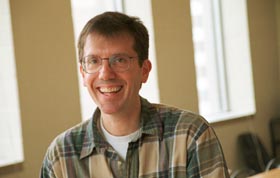
| ||
 | ||
 Psychology professor Richard Koestner PHOTO: OWEN EGAN |
Arguments and artistry: Parental conflict inspires creativity in children
|
HÉLÈNA KATZ | It was the definition of the word "conflict" that journalists misunderstood. Newspaper reports on both sides of the Atlantic Ocean said that a study led by psychology professor Richard Koestner found that warring parents often produced creative children.
Newspaper reports failed to mention that the researchers had defined conflict as the mother's perception that she and the child's father disagreed on childrearing, values and attitudes, Koestner points out. "There was nothing about fighting and screaming at each other," he says. "It's possible that I made a mistake in referring to it as conflict instead of saying it was a disagreement," he ruefully admits. Yet, conflict is the proper scientific term to describe it -- evidence of how scientific research can be misunderstood. Entitled "Childhood Parenting Experiences and Adult Creativity," the study by Koestner, Marie Walker of the University of Western Ontario and Arizona State University's Laura Fichman appeared in the latest issue of The Journal of Research in Personality. It set out to examine the relationship between early parenting experiences and adult levels of creativity over a period of 25 years. No study had ever looked at this issue over such a long time period. The authors used data supplied by the Henry Murray Research Centre at Radcliffe College, which keeps data collected by researchers carrying out long--term studies. "The notion is that the longitudinal data set is so rich and so valuable that it should be something everyone should have the opportunity to explore," Koestner says. Originally collected for a Harvard University study beginning in the 1950s, the data used by Koestner consisted of interviews with mothers when their children were five years old. The interviews dealt with whether or not the mothers expressed any disagreements with the fathers on matters of childrearing and whether the parents had differences in attitudes and values. Fast forward to when the children are 31-year-old adults, to measure their levels of creativity. Each of the 75 subjects had five minutes to write a story about an ambiguous picture they were shown. One photo was of an architect sitting at his drafting table holding a photograph of his family and contemplating something. This exercise was carried out four times with different pictures and six judges later evaluated the stories for their complexity, humour and originality. Previous shorter-term studies had found that warmth in a child's upbringing had a positive impact on creativity, while restrictiveness was negatively related. Koestner found no relationship. What the study did reveal was a relationship between parental conflict when children were young and creativity as an adult. "That's the controversial part," he says. Although his findings contradict current thinking, they are consistent with a number of biographical studies, based on careful analysis of biographies and autobiographies, that suggest a relationship between a difficult family life and later creativity, Koestner says. "I keep having to remind people that creativity is not the same thing as being a well-adjusted, responsible, happy person," he comments. "We shouldn't assume that parenting factors that lead to adjustment will also lead to artistic and literary creativity." Compounding Koestner's problem with the media, the reporter who wrote an article for The Daily Telegraph in England never interviewed him. Unable to reach the McGill professor during the Easter break, the journalist wrote his article after reading and interpreting the study himself. Other media outlets then reprinted the story, errors and all. As Koestner points out, this incident also highlights the different way in which journalists and researchers interpret the results of scientific studies. While his research found a modest positive association between conflict and creativity, this isn't necessarily a reflection of causality. "Scientists don't necessarily say A causes B because there's an association between the two, whereas a newspaper article will," he says. Another key part of the research that media reports failed to mention was possible explanations for the results. With mounting evidence that creativity is genetic, it could be that mothers who are more creative are also more willing to highlight the differences between themselves and their children's father. "That's the kind of thing I mention in a scientific article, but it makes for a more confusing story for people trying to write for newspapers," he says. "They don't want to spend too much time considering limitations and nuances." That became particularly evident to Koestner when television reporters decided not to pursue the story after pre-interviewing him -- much to his relief. "I don't want the publicity," he says. "The reason this got so much attention is because the first person who wrote about it sensationalized it," he says. "This experience has taught me that I have to be more sophisticated in dealing with the media and speak with them at length in order to influence the final article."
|
|
| |||||